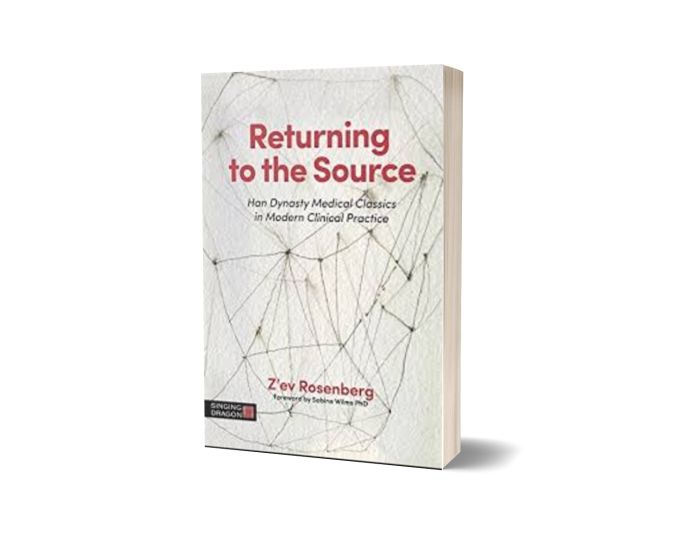We use cookies to make your experience better. To comply with the new e-Privacy directive, we need to ask for your consent to set the cookies. Learn more.
Returning to the Source
Though relatively new in America, the practice of Chinese medicine has grown and persisted long enough to yield its first generation of scholars and master physicians. Z'ev Rosenberg is one such scholar-physician with 35 years of clinical practice and 10 before that studying herbalism, nutrition and bodywork. Additionally Z'ev was chair of the department of herbal medicine for the Pacific Institute in San Diego, California for 23 years. Z'ev exemplifies the classical ideal of the scholar physician, grounding his work in a historical appreciation of the medicine while elaborating its relevance for the era in which we are living according to his practical experience.
There is an implicit view throughout the text that medicine is politics and that perceptions of health and illness reflect cultural values. Z'ev does an excellent job of explaining many of the issues of our day as they reflect a fundamentally unwholesome relationship to, and distancing from, the laws of balance upon which the health of humanity, society and the biosphere are based. He extols a compassionate and optimistic plea to return to the wisdom inherent in the Chinese medical classics, not just for the sake of the integrity of the medicine, but as a vehicle for social change.
Z'ev advocates the integral perspective that a scholar-physician must be a living, breathing representation of the basic principles of the medicine. The practitioner's integrity to the principles of the medicine is a foundation for instilling confidence in the patient through living example. The rectification of the patient is a concrete step toward societal change, including a deeper care and connection to the biosphere and the rhythms of life. Returning to the Source does a beautiful job of laying a foundation for the appreciation of the fundamental principles of Chinese medicine. Z'ev begins by elaborating the importance of possessing a consciously held, overarching philosophical perspective that contextualises the practice of medicine by addressing the questions 'who are we as practitioners aspiring to be scholar physicians, why are we here, and how shall we live in accordance with our commitment?
Z'ev defines Chinese medicine as first and foremost an 'ecological medicine', which is in itself a political affirmation. He then proceeds to outline the contribution of various classics and schools of thought to the ecological view he espouses. This section alone could form the basis of a semester or year-long course with the aim of rooting a Chinese medical curriculum in the classics.
In relationship to the current trend of 'integrative medicine', too often 'integration' is a euphemism for assimilation. Z'ev takes a strong stand insisting that, 'True integration means mutual respect and interaction between two fully developed medical systems.' Chinese medicine must thrive on the merits of its unique ecological approach and be respected for its strengths if we are to benefit from any such integration. This text is a treatise on how to place Chinese medicine on a path of producing a generation of scholar-physicians who might facilitate such a dialectic. The call here is for a medicine based on 'philosophy, not data sets.'
Care is taken to elaborate fundamental principles of the medicine such as yangsheng (養生: nourish life), ganying(感應: resonance), zangxiang (臟象: visceral image) and maizang ( 脈象: pulse image). These are all presented in an ecological and philosophical context creating a coherence of intention throughout the text. Too often these foundational concepts are glossed over in educational curriculums, if they are presented at all. I found the section 'An Approach to Time in Chinese Medicine' to be of special interest. Here Z'ev elaborates the Chinese appreciation for cycles and flows that is so crucial to balanced living and a diagnostic appreciation of how so much modern symptomatology arises from people living out of synch, going against the flow (ni: 逆) of natural rhythms.
Lastly Z'ev provides three intriguing case studies that utilise his approach as presented here. These left me hungry for a more detailed analysis in the future highlighting all the principles so beautifully introduced.
It is my experience that for many practitioners the principles of Chinese medicine are abstract notions applied to the patient as a clinical 'other.' When scrutinised for the balance and harmony that our medicine espouses, the lives of many practitioners suggest that they do not actually believe in the principles of the medicine. In this text, Z'ev makes the compelling case that an authentic understanding of the medicine is based, first and foremost, on living its principles. Returning to the Source provides a roadmap for curriculum development and lays the foundation for Z'ev's future works elaborating the practical applications of the classical perspective. Returning to the Source makes clear that doing so is not just an imperative for the integrity of the medicine, but an essential key to the survival of humanity as well.
Lonny Jarrett
| Author | Z'ev Rosenberg |
|---|---|
| Publication Date | 21 Mar 2018 |
| Publisher | Singing Dragon |
| Number of Pages | 184 |
| Book Format | Softback |
* Orders shipped outside of Europe are eligible for VAT relief and will not be charged VAT.


